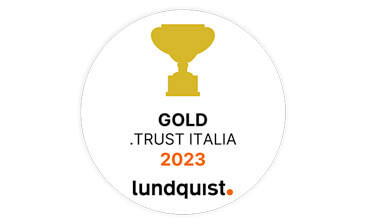The SmartComp composting machine is a mini-treatment plant that transforms organic waste into compost in just 90 days.
The process is fully automated: you will only need to worry about inserting waste in the composting container and collect the product from the compost maker at the end of the cycle.
How does the composter work? Organic waste goes through the transformation process in the composting chamber, which accelerates the natural aerobic degradation of organic waste.
The process consists of three stages. The first two, known as termophilic and mesophilic stages, are active: organic waste is mechanically treated continuously for a period ranging from 30 to 60 days. The last stage, less active, sees the waste mature and lose its moisture.
The output is certified quality compost that weighs less than the input waste, is naturally clean and free from pathogens: ready to use as soil improver and fertilizer.
Acea Innovation's composter has 100 metric, capacity, but is available in different sizes to cater for the different volumes of organic waste its users produce.
Acea Innovation's composters are equipped with advanced IoT technology to monitor the state of transformation in real time, and automate the entire process.
Within the organic mass being treated, there are movement sensors that detect temperature, moisture and interstitial gas in real-time, thus enabling monitoring the environment and the process emissions.
The data collected is analyzed by experts on smart IoT platforms integrated with Business Intelligence; you will be supplied with a dedicated dashboard displaying performance indicators such as the amount of removed CO2 and the amount of compost produced. The process is managed automatically and remotely, with machine learning and artificial intelligence algorithms working in the background to increase efficiency.
Fill the form to send your query: we will contact you and together we will find the best solution.
Discover the latest news and initiatives of the Acea Group

Acea for World Energy Saving Day

Visit the virtual museum about the history of the Acea Group

The channel for the commercial requests on land urbanisation

Acea turns the spotlight on the Rome Film Festival 2023

Acea is in the "Gold class" in the .trust research

Read more about our culture of inclusiveness